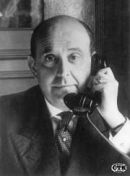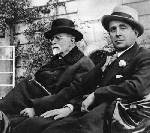Jan Masaryk, Czechoslovak Foreign Minister, died 60 years ago
18.03.2008 / 17:54 | Aktualizováno:
(This article expired 30.08.2010 / 02:00.)
On Thursday 13 March, 2008 Ambassador Jan Winkler held a lecture on Jan Masaryk, the Foreign Minister of Czechoslovakia in years 1940-1948. The Czech embassy commemorated the 60th anniversary of Jan Masaryk´s tragical death.
 Jan Masaryk, a diplomat and the longest serving
Minister of Foreign Affairs was the son of the first president and
founder of Czechoslovakia Tomas Garrigue Masaryk and his
American-born wife Charlotte Garrigue.
Jan Masaryk, a diplomat and the longest serving
Minister of Foreign Affairs was the son of the first president and
founder of Czechoslovakia Tomas Garrigue Masaryk and his
American-born wife Charlotte Garrigue.
After independent Czechoslovakia was created in 1918, Jan
Masaryk entered its diplomatic service. In 1919, he became the
Czechoslovakia's first charge d'affaires in the United States and
in 1925, he was appointed ambassador to the Great Britain. In
protest against the 1939 Munich Agreement, Masaryk left the
diplomatic service and in 1940, he became the foreign minister of
the London-based Czechoslovak government in exile. On the eve of
the Nazi invasion of Poland, Masaryk spoke out about the situation
and the fate of his country on the BBC in London and on September
8, 1939, he started a series of regular radio addresses to the
Czechoslovak people.

After the war, Jan Masaryk returned to Czechoslovakia, where he
served again as a Foreign Minister. In 1947 Czechoslovakia agreed
to participate in the US-funded Marshall plan, a decision
unpalatable for the Soviets. In July 1947, Masaryk and the
Communist Prime Minister Klement Gottwald went to Moscow to
negotiate. "I left as a minister of a sovereign state but have come
back as Stalin's lackey," Jan Masaryk said immediately after his
return from the Soviet Union.
The events of 1947 gradually led to the Communist takeover in February 1948, when the majority of ministers, Jan Masaryk not included, handed over their resignation to president Benes in the hope that fresh elections would be held. Instead, the president accepted their resignations and a communist government was formed. Two weeks after Jan Masaryk met his end on the ground beneath his bathroom window. His death remained unexplained until today, despite the following series of investigations in 1948, 1968-69, 1993-96.




